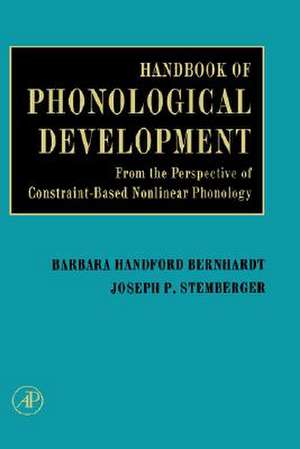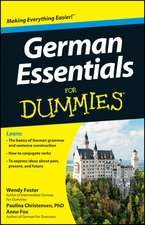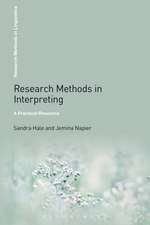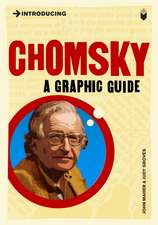Handbook of Phonological Development: From the Perspective of Constraint-Based Nonlinear Phonology
Autor Joseph P. Stemberger, Barbara Handford Editat de Barbara H. Bernhardten Limba Engleză Hardback – 30 sep 1997
The authors focus on speech production rather than perception, emphasizing data from the period of real words. The many tables and phonological trees help to make this timely and useful study accessible to students and professionals alike.
Key Features
* Addresses the full range of phonological patterns observed in children's speech
* Surveys patterns of development in children's speech
* Provides the only existing single framework for children's phonological development
Preț: 486.92 lei
Preț vechi: 632.36 lei
-23% Nou
Puncte Express: 730
Preț estimativ în valută:
93.17€ • 97.54$ • 77.09£
93.17€ • 97.54$ • 77.09£
Carte tipărită la comandă
Livrare economică 31 martie-14 aprilie
Preluare comenzi: 021 569.72.76
Specificații
ISBN-13: 9780120928309
ISBN-10: 0120928302
Pagini: 793
Dimensiuni: 168 x 249 x 187 mm
Greutate: 1.28 kg
Editura: Emerald Group Publishing Limited
ISBN-10: 0120928302
Pagini: 793
Dimensiuni: 168 x 249 x 187 mm
Greutate: 1.28 kg
Editura: Emerald Group Publishing Limited
Public țintă
There are three primary audiences for this work: graduate students through professionals working in linguistics, speech–language pathology, and developmental psychology. These readers will require a general background in phonology, either through linguistics or speech*#150;language pathology.Cuprins
Introduction.
Worldviews for Phonology.
Phonological Representations and Processes.
Constraints.
Segmental Development.
Prosodic Development.
Sequences of Elements.
Theory and Application: Not Just for the Clinician.
Acquisition of Adult Alternations.
Discussion and Conclusions.
Appendix A: International Phonetic Association (1989) Symbols Used in This book.
Appendix B: The Features Used in This Book.
Appendix C: List of the Constraints of Optimality Theory.
Appendix D: Practical Guidelines for Using Constraints.
References.
Index.
Worldviews for Phonology.
Phonological Representations and Processes.
Constraints.
Segmental Development.
Prosodic Development.
Sequences of Elements.
Theory and Application: Not Just for the Clinician.
Acquisition of Adult Alternations.
Discussion and Conclusions.
Appendix A: International Phonetic Association (1989) Symbols Used in This book.
Appendix B: The Features Used in This Book.
Appendix C: List of the Constraints of Optimality Theory.
Appendix D: Practical Guidelines for Using Constraints.
References.
Index.
Recenzii
"The Handbook of Phonological Development provides a compelling and comprehensive examination of the relationship between current phonological theories and phonological acquisition data. The authors draw on their knowledge of linguistics, psycholinguistics, and speech-language pathology to provide a new and exciting view of phonological development within the framework of Optimality Theory."
--CAROL STOEL-GAMMON, Department of Speech and Hearing Sciences, University of Washington, Seattle
"The field of phonological development has been in great need of a comprehensive volume on nonlinear phonology. The Bernhardt and Stemberger book fills this need exceptionally well. It is not only current--including recent treatments of optimality theory--but thorough. Later as well as earlier periods of phonological development are discussed, and there is coverage of children with phonological disorders as well as typically developing children. This book should be read by anyone interested in how children learn phonology."
--LAURENCE B. LEONARD, Purdue University, West Lafayette, Indiana
"Handbook of Phonological Development represents the future of linguistics, psycholinguistics, and speech sciences. It is a compelling synthesis of phonological theory and the learning and processing mechanisms hypothesized in modern cognitive science."
--GARY S. DELL, University of Illinois at Urbana-Champaign
"Language and speech-language pathology students, as well as practicing speech-language pathologists, will find this book a useful resource, as it provides important examples of applying phonological theories in understanding and accelerating language development."
--CHOICE
"Bernhardt and Stemberger are to be congratulated for taking on the important and often difficult task of building bridges between phonology and child phonology, speech-language pathology, and psycholinguistics, and for taking so few assumptions for granted in doing so... a phonologist of any bent should find plenty of interest in this book."
--PHONOLOGY, 1999
"The Handbook of Phonological Development from the Perspective of Constraint-Based Nonlinear Phonology is a valuable resource for any serious student of phonological development. This book is written primarily for researchers, who will want it in either their personal collection or their university's library. It will also make a useful text for doctorial-level seminars in phonological development."
--Mary C. Berni, University of Memphis, JOURNAL OF SPEECH-LANGUAGE PATHOLOGY AND AUDIOLOGY, 2006
--CAROL STOEL-GAMMON, Department of Speech and Hearing Sciences, University of Washington, Seattle
"The field of phonological development has been in great need of a comprehensive volume on nonlinear phonology. The Bernhardt and Stemberger book fills this need exceptionally well. It is not only current--including recent treatments of optimality theory--but thorough. Later as well as earlier periods of phonological development are discussed, and there is coverage of children with phonological disorders as well as typically developing children. This book should be read by anyone interested in how children learn phonology."
--LAURENCE B. LEONARD, Purdue University, West Lafayette, Indiana
"Handbook of Phonological Development represents the future of linguistics, psycholinguistics, and speech sciences. It is a compelling synthesis of phonological theory and the learning and processing mechanisms hypothesized in modern cognitive science."
--GARY S. DELL, University of Illinois at Urbana-Champaign
"Language and speech-language pathology students, as well as practicing speech-language pathologists, will find this book a useful resource, as it provides important examples of applying phonological theories in understanding and accelerating language development."
--CHOICE
"Bernhardt and Stemberger are to be congratulated for taking on the important and often difficult task of building bridges between phonology and child phonology, speech-language pathology, and psycholinguistics, and for taking so few assumptions for granted in doing so... a phonologist of any bent should find plenty of interest in this book."
--PHONOLOGY, 1999
"The Handbook of Phonological Development from the Perspective of Constraint-Based Nonlinear Phonology is a valuable resource for any serious student of phonological development. This book is written primarily for researchers, who will want it in either their personal collection or their university's library. It will also make a useful text for doctorial-level seminars in phonological development."
--Mary C. Berni, University of Memphis, JOURNAL OF SPEECH-LANGUAGE PATHOLOGY AND AUDIOLOGY, 2006











